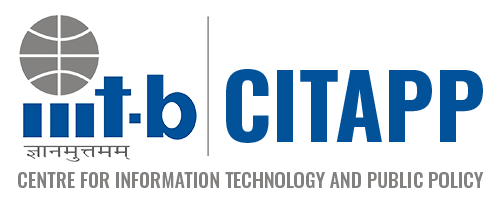The Center for Information Technology and Public Policy (CITAPP)
International Institute of Information Technology Bangalore (IIITB)
organized a talk titled
Working futures:
The ILO, Automation and Digital Work in India
by
Kaveri Haritas
O P Jindal Global University
2:00 pm – 3:30 pm on 7 January 2020 (Tuesday)
Venue: R106, IIITB campus
26/C, Electronic City, Hosur Road, Bangalore
About the talk: India is currently witnessing an unemployment crisis, with youth unemployment slumping phenomenally. Media debates on unemployment emphasise the role of demonetisation and GST, without paying sufficient attention to technology and its impacts on the future of work in India. India is not alone in witnessing this slump in jobs, it is a phenomenon that is a global one, that impacts both developed and developing economies. Technology plays a vital role in this crisis, with differential impacts in different countries. In developing economies, the potential for technology to take away routine jobs is much higher with greater impacts on a higher number of low skilled workers. Organisations such as the ILO have to thus respond to this global employment crisis.
The article I present ask questions on the nature of social and political responses required to deal with this transformation. In a context of jobless growth, automated production and digital work mediated through privately owned global technology platforms, how should organisations such as the ILO chart out policies on work. By examining India’s job market, with a focus on the country’s information technology (IT) industry, this article assesses whether the ILO’s focus on labour rights and social protection is suited to addressing the potential for capital–labour substitution and the new ecosystem of software-mediated work. Drawing from data on work and the experience of workers in a digital economy, we suggest a new engagement with digital labour, closer scrutiny of unregulated working conditions, and democratic control over tech-enabled digital platforms.
Speaker Bio: Kaveri Haritas is Associate Professor at the Jindal School of Government & Public Policy. She has a bachelor’s degree in law, a Masters and PhD. in Development Studies from the Graduate Institute of International and Development Studies, Geneva, Switzerland. She was funded by the Swiss National Science Foundation for her doctoral studies (CanDoc), which examines the struggles of poor women and men in a rehabilitation area in Bangalore. Her research that examines the politics of the poor, citizenship, law and gender is being published in the form of a book with the Cambridge University Press. Kaveri is part of research projects between India, Switzerland and France. Her most recent research includes work on solidarity economy practices of women in Latin America and India, supported by the Swiss Network of International Studies and technology and the future of work in India. With an education in development studies, she has a marked leaning towards anthropology, uses ethnography in her research and enjoys research and teaching in the areas of political and economic anthropology.
